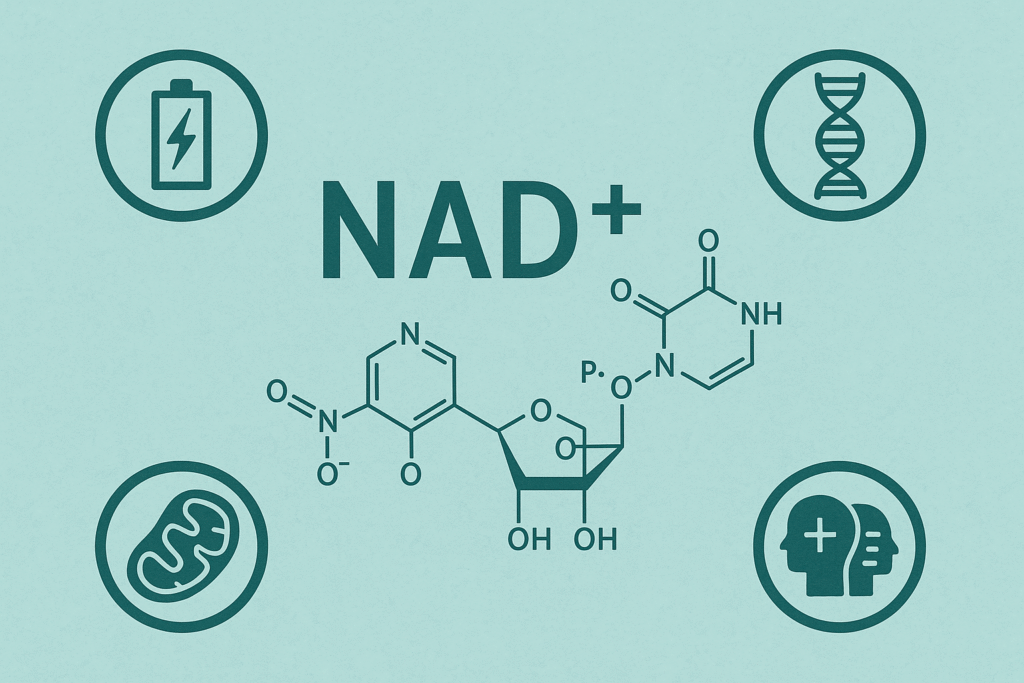Cell energy, youthfulness and longevity in one molecule?
In the world of Biohacking and longevity research one term in particular has come to the fore in recent years: NAD+. But what exactly is behind this mysterious molecule? And why is it considered a key factor in the fight against ageing?
The answer is impressive - because NAD+ influences central processes in our bodyfrom cell metabolism to DNA repair.
What is NAD+ actually?
NAD+ stands for Nicotinamide adenine dinucleotide - a coenzyme that occurs in every single cell in the body. It is crucial for:
- Energy production in the mitochondria
- Cell repair processes
- Control of the metabolism
- Activation of the so-called Sirtuins - Enzymes that are considered "longevity proteins"
The higher the NAD+ level, the more actively these processes function - especially at a young age.
Why does NAD+ decrease with age?
From around the age of 30, the NAD+ level drops continuously - in 60-year-olds it is sometimes over 50 % below the level of a young adult.
Reasons for this:
- Oxidative stress
- Inflammation ("inflammaging")
- Environmental toxins
- Malnutrition & lack of exercise
- Chronic lack of sleep
This drop has a direct effect on cell energy, regeneration and the Function of vital organs from.
NAD+ effect in the ageing process
1. Cell energy & mitochondrial function
NAD+ is essential for the conversion of nutrients into energy (ATP). Less NAD+ = less cell power.
2. DNA repair & cell protection
NAD+ activates enzymes such as PARPwhich repair DNA damage. Low NAD+ levels lead to a higher mutation rate and cell ageing.
3. Activation of the sirtuins
Sirtuins regulate inflammatory processes, fat metabolism and even the Telomere length. Without NAD+ they remain inactive.
How can you increase NAD+ naturally?
1. Intermittent fasting (e.g. 16:8)
Fasting stimulates the body's own NAD+ synthesis and sirtuin activity.
2. Endurance training
Exercise activates genes that are responsible for the production of NAD+.
3. Tryptophan-rich diet
NAD+ is formed from tryptophan, among other things. Contained, for example, in:
- Oat flakes
- Lenses
- Bananas
- Brazil nuts
4. Food supplementation with NAD+ precursors
- NR (nicotinamide riboside)
- NMN (nicotinamide mononucleotide)
Studies show that they can increase NAD+ in blood and tissue - especially in older people.
NAD+ - the key to cellular rejuvenation?
Research suggests that the increase in NAD+:
- Slow down cell ageing
- Increase the ability to regenerate
- Reduce inflammatory processes
- delay age-related muscle loss
- can even influence neurodegenerative diseases
Conclusion: NAD+ as the foundation of longevity research
NAD+ is more than a trend - it is an evolutionarily proven moleculewhich intervenes deeply in our cell mechanics. If you want to age healthily, you can't avoid NAD+. Whether through diet, lifestyle or targeted supplementation: The key to cell rejuvenation lies within yourself - and in your NAD+.
